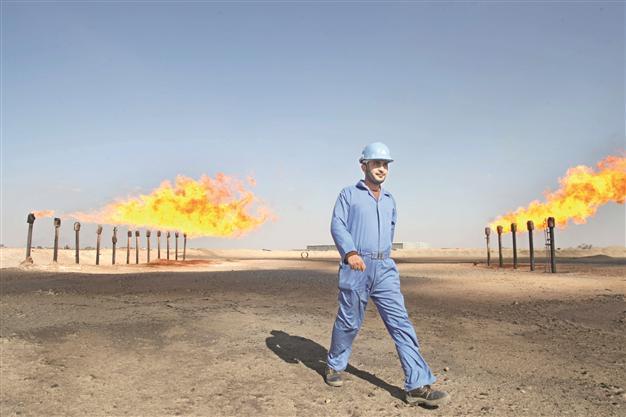Iraq denounces Kurdish oil exports via pipeline to Turkey
BAGHDAD / WASHINGTON

The ministry in Baghdad expressed astonishment at the move and described it as a 'flagrant violation of the Iraqi Constitution.' AFP Photo
Iraq’s Oil Ministry expressed “deep regret and astonishment” on Jan. 10 over plans announced by the Kurdistan Regional Government (KRG) to begin pumping oil to Turkey without central government approval.
The first crude has begun to flow, and exports are expected to start at the end of this month before rising in February and March, the KRG said Jan. 8. KRG’s new pipeline carries the oil to Turkey’s Mediterranean export hub of Ceyhan.
The ministry in Baghdad expressed astonishment at the move and described it as a “flagrant violation of the Iraqi Constitution.” The statement came a day after U.S. Vice President Joe Biden urged KRG President Massoud Barzani to work with the governments of Iraq and Turkey to resolve the conflict over the region’s oil.
Biden called Barzani on Jan. 9, the same day his government announced it had unilaterally started sending crude to Turkey. The White House said Biden encouraged Barzani to talk with Baghdad to develop a way forward.
Biden has also been working the phones this week as violence flares in Iraq two years after the U.S. pulled out troops. He has spoken twice with Iraqi Prime Minister Nouri al-Maliki and once with a leading Sunni lawmaker.
The statement from Iraq’s Oil Ministry also rebuked the Turkish government for allowing the Iraqi-Turkish pipeline system to be used to pump and store crude oil produced in Kurdistan without Baghdad’s approval.
The ministry said the planned oil exports breached a Dec. 25, 2013, agreement between the Iraqi government and the KRG which called for experts from both sides to discuss how crude from Kurdistan could be exported under the auspices of Iraq’s State Organization for the Marketing of Oil (SOMO).
Kurdistan’s bid to sell oil and gas independently has infuriated officials in the Iraqi capital as Baghdad has long insisted that the central government retains sole authority over managing Iraq’s energy resources.
Iraq’s Constitution mandates that all Iraqi oil revenues go through the central government in Baghdad and that the Kurds then receive 17 percent, although they frequently complain that they have received less than that.
The ministry threatened legal action against any companies that trade in “smuggled” oil or gas from Kurdistan without going through SOMO.
Companies that have taken the risk of exploring for oil northern Iraq welcomed the KRG announcement as a signal they might begin to generate export income from their investments, despite Baghdad’s objections.
“We’ve been waiting to read these words and hear these words since 2007,” said Todd Kozel, chief executive of Gulf Keystone which has Kurdish government approval to exploit what it says is one of the world’s largest onshore exploration fields.
“It’s music to any operator’s ears in Kurdistan. It’s the monetization of our assets,” he told Reuters on Jan. 9.
The Kurdish region has blossomed economically under self-rule as the only part of Iraq to escape the violence unleashed after the U.S. invasion that toppled Saddam Hussein in 2003. Although the early flows are predicted to be modest, its oil exports have the potential to redraw export routes across the region.
